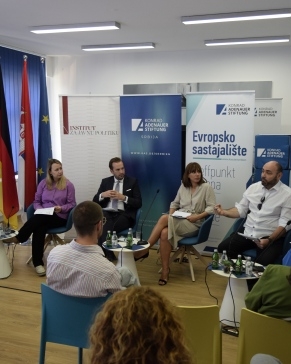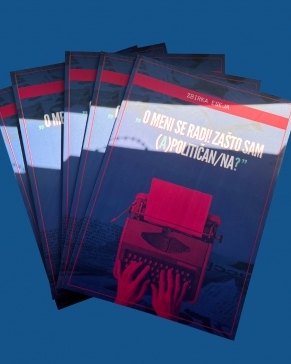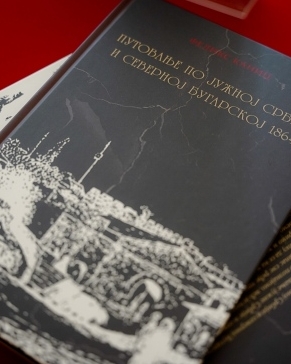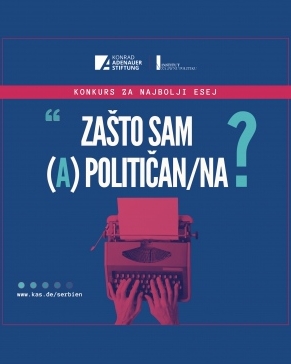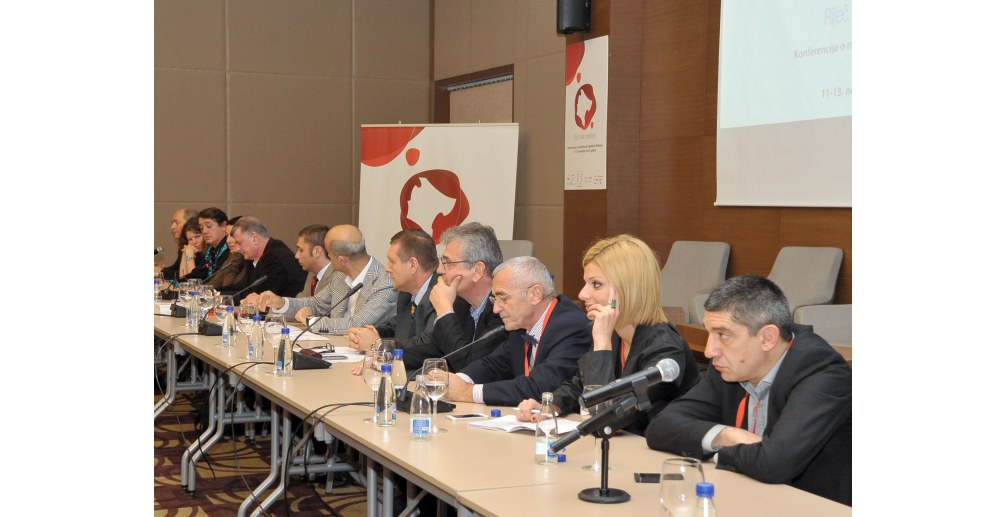
The participants of the biggest media gathering ever held in Montenegro have announced, on the second day of the conference “Word, Image and Enemy”, that the “construction of affairs and tabloidization are the greatest threat to the journalism”. They have also pointed out that the state must not withdraw in front of the obvious violation of journalist ethics.The topic of yesterday’s sessions at which distinguished journalists and media experts conversed was “State as the Public Enemy “.
Tabloidization problem
Speaking about media spinning, journalist of the B92 Television and the author of the programme “Insider“, said that “There is the tabloidization problem in Montenegro as well “.
- We are dealing with the assassination of Zoran Đinđić even today, as this is the only topic that we have not managed to bring to en end, regardless of the fact that we collected all evidence and facts – Stanković said. Speaking about media spinning, Brankica Stanković said that we also have problems with “tabloids and the so-called media “.
- We have solved that problem in a way that we have based our work on facts. We have not given up, even besides media and other attacks aimed against us. We have concluded that we publish facts and that our and their truths cannot coexist. They have gradually given up, they let us alone when I warned them that if they continued to publish lies about us, we would publish the truth about them –Stanković said.
Media “spinning“
Director of EBART Media Archive, Velimir Ćurguz Kazimir, presented the research on the influence of media on political developments in Montenegro and Serbia. Ćurguz talked about “spinning“ carried out by media, presented data on affairs designed before the assassination of Zoran Đinđić, the most famous of which was “tobacco affair“ which, as he said, has still been popular.
- Regarding the chase of Đinđić, you may see the connection between Serbian and Montenegrin media, where “Dan” takes part in marketing the stories that Zoran Đinđić is behind various shady actions. Then, “tobacco affair“ takes part, which starts by a small and unimportant text which says that the tobacco merchant lends his plane to Đinđić, the result of which is the story that Đinđić uses the services from Stanko Subotić. After the death of Zoran Đinđić, that affair is transmitted to Milo Đukanović and it still lasts – Kazimir said. He also explained the way how printed media treated the acquisition of independence of our country.
- I would like to focus your attention to the year of 2007. Something very unusual happened in Serbian press. The number of texts was double reduced. At the moment of the proclamation of independence, Montenegro ceased to be the topic as it used to be in the Serbian press before –Kazimir pointed out.
Fear from opponent media
According to the Head of the Government Bureau for Public Relations and experienced journalist, Srđan Kusovac, absolute securitization of judiciary represents the greatest danger for Montenegro.
- A person, who is in jargon called the leader of media mafia, publishes an article at least four times, or even more, during recent several years. So, with the fact that one of the owners of “Vijesti” media company, who says that supreme public prosecutor is the “servant of the regime”, there are permanent attacks to judges. This results in the fact that several key court cases have not been put into procedure. Everyone is afraid of appearing on the cover page of Vijesti or Dan – Kusovac said. According to him, the problem is that the state does not react in certain cases “in which people, due to various reasons, express their right to protest and simultaneously they gepardise someone else“.
Svetislav Basara, writer, said that media in Serbia became “extended arm of killing forces “.
- A group of people were not fond of the fact that Đinđić be alive, so they were killing him through media. The question is whether this could be changed, as we stepped deeply into vandalism and barbarism – Basara said.
“Anatomy of one Chase”, the book written by Šeki Radonič, was presented at the conference yesterday. The book is, as it was reported, the analysis of Montenegrin media space, but also the personal confession related to the satanization of Radončić made by his previous colleagues. “Sto faca i Aca“, the book written by Croatian journalist, Aleksandar Stanković, was also promoted at the Conference.
Three-day Conference will be finished today by opening the exhibition for public “Word, Image and Enemy“. The goal of this gathering was to initiate the questions of the role of media in the process of political instruments in media, violation of human rights in journalist reporting, as well as other harsh violations of ethics and journalist profession standards.
Media have to get rid of the politics 
On the second day of the Conference on Media in Western Balkans: “the Role of Media in Securitization Process”, former Spokesperson of the Hague Tribunal, Florence Hartmann, shared a part of her experience in reporting during the post-war period.
- Key media in the region principally dealt with the emergence of war journalism during the coverage of post-war period, i.e. when the facts that have to aid to overcome these divisions are discovered. They cared more about the colour of a tie of Slobodan Milošević or someone else, than about the facts that were presented during the trial for war crimes, which were published by media – Hartmann said. She explains that she does not believe in the power of media, as they returned to the sharp control of the politics.
- The goal you have to strive to is that media get rid of politics and become much more professional – former spokesman of the Hague Tribunal explained.
Abolishing libel was a wrong decision 
Speaking about new media and ethical standards, the representative of the Association of Local Printed Media, Amer Ramusović, said that abolishing libel as a crime was a wrong and anticipatory decision, which was contrary to the laws in effect in the largest number of the EU Member States.
- The polarization of media in our country is so vivid that the truth cannot be figured out, and Montenegro bears serious consequences as it deleted the insult and libel from the Criminal Code. This means that an individual has no chances to fight against journalism that deals with labelling without arguments –Ramusović said. He adds that sensational texts, publishing untruths, insults and libels for the account of others, under the patronage of investigative journalism, under no circumstances should be the prerequisite for the freedom of media, as they usually present.
Event which excels Montenegrin borders
Ambassador of Croatia, Ivana Sutlić-Perić, said for Pobjeda that this Conference is an event which excels Montenegrin borders and which gathered the best professionals from the region.
- Authorities have to standardize ethical framework of journalist profession. The limit has to be known, as if everything was allowed then there would be a political anarchy, which is the current situation in today’s journalism – Croatian Ambassador said.
Facing virtues and drawbacks
- The Conference is a good start for facing of Montenegrin journalism with its virtues and drawbacks. I think that a huge value of this Conference is that it is openly spoken about the problems of Montenegrin journalism, and, of course, the lack of professionalism. I think that only by the means of such type of discussions and consideration of our own problems, we may improve both the media and the society – editor of Analitika Portal, Draško Đuranović, said for Pobjeda.
Montenegro in internal media war
- This is the story that lasts for ages and decades. The problems are more or less the same in Montenegro, Bosnia and Croatia. The intensity of such problems is somewhere greater, somewhere smaller. Montenegro is currently in much larger internal media war than Serbia. Five years ago, such war was larger in Serbia. Croatia took some other road, while their media war is more economy oriented and they do not have such type of political passion that exists in Serbia and Montenegro – editor of E-novine, Petar Luković, said for Pobjeda.
Region has not solved the media issue
The fact that the gathering is related to the whole region is very positive, as the region has obviously not solved the issue of media, media freedoms, financial positions and ownership. Numerous questions were opened here. I think that it has been confirmed that media could not be better than the society in which they function. These are transition societies, faced with plenty of different crises and the same destiny is shared by the media. It is good that media speak about it and that current situation, which is more or less bad, is being identified. This means that something will be done – Boško Jakšić, from Politika, said.
Theses and accusations prior to information
Al Jazeera Balkan Programme Director, Goran Milić, said for Pobjeda that the Conference “touched some topics which should be later on the agenda for discussion“.
- It is logical that new media on the small territory want their voice to be heard as far as possible, and in that sense they use very loud instruments, which are often very radical, without being previously checked. Very often they use theses and accusations prior to information – Milić said.
Freedom and responsibility
- All topics and problems tackled at this Conference could be summarized as the relationship between the freedom and responsibility. Our undoubted commitment for the freedom of media and expression has to go along with the request that media and journalist be responsible and aware of their profession. This is essential both for the needs of the society and the needs of media. We have to make young people become media literate, so that they learn to use media and differentiate between manipulation and truthful information – Velimir Ćurguz Kazimir, journalist and writer,said for Pobjeda.
Dismissing libel – a step back
- We are the witnesses that in large number of Montenegrin media, information and the freedom of expression are used for the sake of drastic abuse. Such media abuse has grown to the extent that there is a pressure to judiciary. Dismissing libel as a crime from our legislation is a huge step back. Wishing to free media space and ensure the freedom of speech, we actually went in totally opposite direction –doc. Dražen Cerović, PhD, professor at the Law Faculty, said.
Good guidelines 
HRT Journalist, Aleksandar Stanković, says for our daily that it is good that such Conference has been organized.
- It is good that this Conference has a regional dimension and many clever things were communicated during panels. The Conference may provide certain guidelines and to certain extent influence to overcome the indicated problems in media – Stanković said.
Obverse and reverse of media culture
- The Conference has fully met the expectations. The topics on obverse and reverse of media culture were opened. Greater media literacy is needed so as to understand the consequences of securitization from the perspective of what it means for the citizens, community and the state. This gathering was a good opportunity to intertwine the arguments related to this topic and it fully met the expectations – Deputy Minister of Culture for Media, Željko Rutović, said.
They took the power from themselves
- I consider the Conference as a good way of networking, socializing and seeing how each of us manages in our countries. I think that all Balkan countries suffer from the same disease. It seems that the transition does not end. Apart from this, we have another handicap. We are engaged in journalism in an environment that does not protect journalists.
General situation, as well as our journalist dilettantism led to the fact that journalism is becoming irrelevant, as we took the power from ourselves –Goran Mihajlovski, Chief Editor of “Vest“ Macedonia, said.
Media more powerful than politics
- The Conference signalized something we have already known and experienced in different dimensions. Media manipulation is structurally very similar in both Croatia and Montenegro; there is just the question of intensity. Oligarchic pressures are so strong that they influence political decision making, and it could be said that at this moment media are more powerful than politics, as, actually, they produce or humiliate or expel politicians themselves – Antun Vujić, former Minister of Culture in Croatia, said.
It is much easier to work for the foreigners
- The Conference has been organized excellently. This is an opportunity for everyone to share their major concerns, and as you see, the whole region has the same problem. It is much easier for us who work for the foreigners. There are large and strong companies standing behind us, which may defend from any political impact. Unfortunately, due to tough economic situation, media here are more susceptible to this impact. I did not know that there is such media suspense in Montenegro. I think that the state and public authorities have to react. As there is the fear of journalists from the state, I see that there is the fear of the state from some media. The state, when it wants to be the strongest, should and can be the strongest – Jakša Šćekić, Reuters journalist said for Pobjeda.
Dictate of the market law 
Nataša Ružić, professor at the Faculty of Political Science in Podgorica, says for Pobjeda that the countries from the region have been faced with the same problems - the lack of transparency and professionalism.
- I don’t say that there are no well-educated journalists, we have them owing to the Faculty but the problem is that laws of the market are such that they dictate this situation. The possibilities provided by new media are not sufficiently utilised and there is a low level of media freedom – professor Ružić said.
The same problems in Balkan states
Vesna Mališić, NIN journalists, thinks that it is good for journalists to talk about the problems which are, as she said, the same everywhere in Balkans.
- It is important that the Conference opened issues of ethics and new social networks and influence of politics, especially the issues of regulation and self-regulation, we will do nothing for this society until journalists return what is called forgotten responsibility for word, until they return the power to journalism, since they are the only ones who can do this by responsible, critical and independent journalism. This is because media are the allies of the society, not of political, economic or criminal groups –Vesna Mališić, NIN journalist said.
I finally heard one good thing
-Once more has been confirmed that, regardless where we live or regardless of our surroundings, 90 percent of things that are problematic for us still continue to trouble us. Therefore it’s good to organize meetings such as this from time to time and to talk about it. The goal of my presence on this gathering was to hear at least one good thing or experience that is applicable in my editorial office – said Ivan Cvejić from Beta news agency.
Arguments without repercussionsin public
-The problem in Montenegro is not the lack of media professionals, but the fact that media that seriously report with arguments do not have any echo in public. Whether you wrote the worst or the truest, the reflection would be the same. Somebody says that hatred does not sell newspapers. I say it does! That’s why we need such gatherings – Mihailo Radojičić, publicist, said for Pobjeda.
Exhibition: “Word, Image and Enemy“: Cover Pages are the Witnesses of the Situation in Journalism
PODGORICA – Exhibition “Word, Image and Enemy” was opened in the Art Pavilion in Podgorica. Cover pages from printed media from Montenegro, region and world have been exhibited in the gallery. Predominantly cover pages of dailies Dan and Vijesti are exhibited, as well as weekly - Monitor, but also other regional and world media which represent the tabloid journalism. Editor of the exhibition, journalist Branko Vojičić, said that, judging from the pages of certain media, one could have an impression that “Montenegro represents affairs, sensations and scandals“.
President of the Governing Board of the Conference, Ranko Vujović, pointed out that the goal of the exhibition was to try to present, by images, what it means to breach journalist code of ethics.
- Next year, this Conference will include the provision of awards for professional journalism –Vujović announced.
The exhibition was attended by the Prime Minister, Milo Đukanović, mayor of Podgorica, Miomir Mugoša, vice president of Democratic Party of Socialists, Svetozar Marović, as well as media experts and journalists who participated at the Conference “Word, Image and Enemy“. Within the following three weeks of the exhibition, the citizens will have the opportunity to see more than a thousand of examples of media reporting in Western Balkans and worldwide, which represent direct violation of all media standards and norms of journalist profession. Editor of the exhibition, Branko Vojičić, journalist and publicist, former editor of Montenegrin National Radio and Television, said that this exhibition was developed by journalists “to what extent we are free and responsible?“.
- Press is one of the most significant discourse beating hearts for the public and as such, as it shares the destiny of the society in both sickness and health, it seems that Montenegro, from which majority of displays originate, is a new Minotaur in its journalist mirror - Vojičić said.
Doyen of Montenegrin Journalism, Danilo Burzan, addressed the visitors at the opening of the exhibition last night, and said that “the task of journalists is to make that the next gathering be characterized by greater deal of optimism “.
- It is not such a problem that public is poured with lies and half-truths, but it is important to understand why such media hustle and bustle is well received by the public – Burzan said, when he officially opened the exhibition.
Source: www.pobjeda.me

